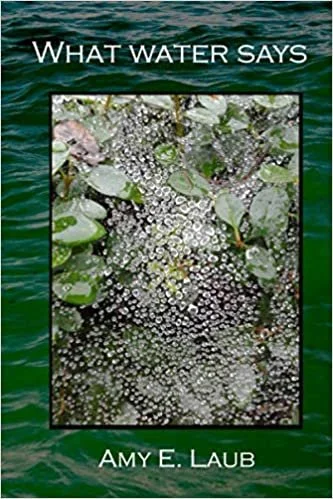Amy E. Laub depicts, in delightful fashion, the complex and intimate relationships between humankind and Nature—especially water—in her recent collection, What Water Says.
In a straightforward and conversational voice, Laub explores the roles of the natural world in 75 pages of open verse poetry. Clearly attuned to her surroundings and with a keen eye for detail, she writes with the precision and authority of an astute observer.
Laub introduces the premise of people being inextricably tied to Nature in “All Fall,” the collection’s opening poem, in which she says, “We all fall. We always do.” She likens the “falling” of humans to that of rain, caught in an inevitable cycle.
The narrator’s affinity—indeed, her intense need—for water is illustrated in “Thirsty,” in which she describes being outside when it starts to rain, and embracing the sensation:
a few rain drops
can keep me from dying
of thirst.
Nature appears as counterpoint to the world of indoor labor in “February Garden.” After working in her garden, Laub’s narrator proclaims, “Tomorrow in the office / my stained fingers will be proudly typing.” The contrast between natural and unnatural is further elucidated in “Driving Out to the State Park/ Instead of Going into the Office.” In an outdoor setting, Laub reflects,
The sunlight here
is not a square on the floor,
divided.
This understated yet effective observation suggests Nature as whole and authentic, in contrast to the fractured, removed quality of office life.
The collection sparkles with Laub’s creative, spot-on descriptions, in which she frequently personifies Nature. In “Storm Comes Slowly,”
Trees swish their skirts
flirting like mad…
Portulaca snap shut
their purple and yellow purses.
In “Stupid Spring,” during the sexual excess of the season of rebirth, “daffodils nod and nod/agreeing to anything, anywhere.” And in a favorite of mine, “Sun Down,” Laub refers to the sun as “that old arsonist” who “sets the snow on fire.”
The weather in Water tends toward tumultuous, unsettled. In “Tantrum,” a storm seems to express the narrator’s own turbulent feelings: “This storm came gladly /to do my bellowing.” Likewise, in “Creek in Shortridge Memorial Park,” one gets the sense that a stick marooned on creek rocks embodies the narrator’s own restless longing: “It stands tall above its prison/staring at the places it cannot go.”
The relationship to Nature that Laub describes is mercurial. Sometimes she’s at one with it, as in “Creek at Spring Gulch,” in which the narrator feels compelled to sit by the water in the early morning “so it can wash through my heart.”
In another favorite poem, “A Flute Runs/Cool Hands,” Nature serves the role of instructor:
The fish in the creek
show the flute how to be
more silver
more air
less lung.
The notion that Nature holds answers and is worth emulating also emerges in “Guzzle” when the narrator addresses the trees:
How clever you are
to let everything go
for a season of rest
how smart, how sane.
Other times, however, the narrator reports feeling oppressed by the natural world. In “Too Hot,” she says, “The heat is awful this year…sweat runs down my face/my own salt burns my skin.”
Laub also gives readers a sense of the narrator’s domestic life—we glimpse her neighborhood and the stuff of her everyday existence. There’s the “always angry shrieking neighbor” in “Too Hot”—and the “squirm of little girls” that greets her when she arrives home in “Little Girls.” The latter poem showcases Laub’s gentle humor, which bubbles up here and there throughout the collection.
But something more serious lies beneath the surface of this book. In “Too Much,” Laub’s narrator describes embodying the rain, and watching people prepare for a flood:
I watch you fill sand bags,
admire your labor,
appreciate your panic.
However, she reveals that
I want this flood.
Everything,
all, will be washed.
The poem conveys a trace of the ominous, a suggestion of apocalypse.
At the end of the book, Laub invites us to recall our fundamental connection to water. “My hands remember being webbed,” she says in “Lap Swimming.” She goes on to describe the power of water to transform: “I grow smaller and lighter as the water deepens.” Laub continues, “The fluid of the cells/is separated only slightly from the fluid of the pool.” She gives us a sense of returning to something to which we belong—a notion punctuated by the collection’s final poem, “Water into Water”:
Only skin, that fragile border
wrapping lymph and spit and blood,
keeps us from disappearing
into howling wild water.
Like Nature itself, Laub’s book demonstrates multiple moods. It dances, storms and steams us, invites and dazzles us, and ultimately swirls us along on a triumphant and thoroughly enjoyable journey.
Abbey J. Porter writes poetry and memoir about people, relationships, and life struggles. She holds an MFA in creative writing from Queens University of Charlotte, an MA in liberal studies from Villanova University, and a BA in English from Gettysburg College. Abbey works in communications and lives in Cheltenham, Pa., with her two dogs.


